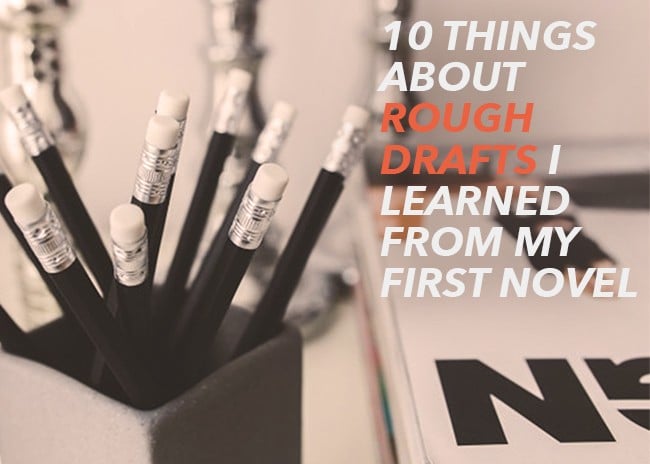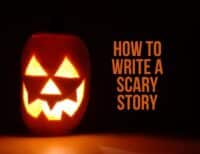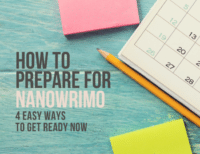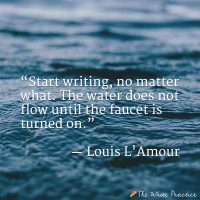There’s no feeling quite like the moment you realized you’ve completely finished the rough draft of a work in progress. A mix of pride and accomplishment and utter dread at how bad it might be.

When I got to the end of my first novel’s draft, I could hardly believe I’d really made it to the end. It took much longer than I’d expected to reach that accomplishment—and there was a lot more left to go than I could have anticipated.
What I Learned About Rough Drafts From My First Novel
But I learned a ton along the way. As my novel finally nears its publication release date next month, I’ve been in a reflective mood about how I got here. And I want to share the lessons I’ve learned along the way.
Here are 10 things I learned about rough drafts, from my own first novel:
1. Celebrate—it’s a big deal!
No really. Completing a rough draft is major. Be sure to take a minute and appreciate that. Tell a writer friend and celebrate together. Do you have any idea how many novels are started, just to taper off when writers block hits, a challenging life moment comes, or the idea loses its luster. But not yours. You finished.
2. But keep your head in the game.
The first draft is maybe 75 percent of the process…but that last 25 percent is the most important. That last 25 percent can be getting published and getting lost in the sludge pile. This is a crucial turning point for your manuscript, so stay focused and keep doing the work.
3. A rough draft is a hot mess.
Really, a total mess. But then, well, that’s exactly what a rough draft is supposed to be. Embrace it. Accept the mess. Shape it into the amazing story it’s meant to be.
4. But it’s not as bad as you think.
Sure, rough drafts are a mess. But they’re also almost definitely way better than you’ve worked up in your head. When you look back all you can remember is those painful hours spent wrestling with writer’s block and forcing out word after word. You expect to plow your way through with a permanent wince on your face, but have heart. It’s more likely you’ll be sighing with relief and thinking, “This is way better than I thought.”
5. You probably forgot a lot of what you wrote.
And when you’re creating an entire, complex story along the way, well, sometimes those ideas just get lost in the deluge. A handful of “did I even write this?” moments lie ahead. Like a box of chocolates, some of those forgotten ideas will be full of gooey delicious caramel story potential. Others are more like Krispy bar, and you just toss them away.6. Put the red pen down and back away slowly.
Don’t edit your work on your first read-through of the draft. Instead, use this as a time for review and brainstorming. I used a combination of comment bubbles in Word and written notes to compile a series of questions, new thoughts, inconsistencies, and whatever else came up, so that they were separate for later reference.
7. Your plot is still baking.
When my rough draft was finished, I was about 10,000 words short of a full manuscript length, and about two-thirds of the way to my final plot. This is to be expected. The rough draft is essentially a brain dump, letting you get those idea-seeds out of your head and onto the page where they can bloom. And this clears your head to create new ideas and build from round one.
8. Hold off on the finer points.
Don’t worry about hitting the missing commas or running spellcheck yet. There’s a lot of big-picture stuff to get in order before you start fussing around with this. Trust me.
9. Move mountains.
So then what should you be doing? Now that you’ve got the story out, you get to go back and play director. Finesse the timeline, round out your characters, weave in and tie up your plot threads, bring your setting got life. This is that last third of the plot I mentioned in #7. And it’s honestly the most fun part of the entire novel writing process.
10. You’ve totally got this.
It can be really frustrating and sometimes it all seems like too much. At least once, you’re sure to think, this manuscript just needs too much work—I’d be better off forgetting about it and starting something new. But don’t listen to that voice!
Because if you can get through a complete rough draft, you’ve got what it takes to see it to the finish line.
What's the first thing you do after finishing a rough draft? Let us know in the comments section.
PRACTICE
Getting started on reviewing your work is the hardest part—once you get started you realize it isn’t as bad as you think. Review a section of your work in progress or recent completed draft. How does it read? How can you improve it? What does this section still need? Take fifteen minutes and get to work on it. Then, share your updated work in the comments.







I just finished my first draft and I’m doing NOTHING for a while. No writing, just all the reading I put aside while I was getting it done. I’ve even decided not to work on that second book I have a feeling I could knock out in far less time because I need to have a break from writing of any kind for a few weeks.
But oh, the euphoria of getting it done–you’re sooo right! I’ve been celebrating for days!
Congrats, that’s great! Absolutely, sometimes your brain needs a break 🙂 Good luck with the edits, when you get back to it.
Thanks for the great post. I like No. 8 especially; it reminds me of the scene in Get Shorty where Delroy Lindo and Travolta are talking about writing a screenplay together. Lindo says that all you have to do is write the story, and then “you hire somebody else to fill in the commas and shit where they belong.”
http://www.writebynight.net/blog/
Ha, love it. Thanks for sharing!
Great post, Emily. Thanks! I finished a draft in early December, and I’ll be getting back to it in the next week or so, so this is perfect timing
Congrats! Hope this helps prep you to dive back into it and make that manuscript its very best 🙂
Thank you! 🙂
Thanks, Emily, for this post. I am waiting for my editor to return the first draft of my memoir…Exciting but also nerve-wracking!
Good luck, Bettina!
Thanks, Emily. I received the manuscript back yesterday. I am very happy about the valuable feedback and professional comments from my editor. There are two major points I need to further develop and your blog post is a great guideline how to approach it.
This is great! I hit #7 with my most recent WIP–the climax surprised me and the whole thing wound up being about 20,000 words shorter than expected. I’m excited about fleshing everything out to give it proper space in my rewrite.
Good luck Alyssa – I found that when I went back and added some very necessary plot threads and fleshed out my settings, I had more than the word count I needed. I’ve written about this specifically before — for extra guidance, take a look here: https://thewritepractice.com/too-short/
Thanks for this post, it was great but does this apply to short stories as well? That’s all I have written up to now. I have yet to write a novel.
Good point, Daria. I’d say most of this still applies — though depending on length I imagine you don’t forget as much of what you wrote 😉 But for sure, even when I write a short story, I find that maybe a good 1/3 of the final story is still to come, and certainly do those big edits before getting into the grammatical stuff.
My stories are usually no longer than 8,000 words when I’m done editing but I usually let the writing process happen first. I once got so into the process that my story was over 10,000 words.
At just on 70 I can say I’ve never read a fiction novel. Having seen some of the tripe that is offered it astounds me that people can read such hog-wash. And I truly admire people’s infatuation with that kind of stuff.
However, I do stand in awe of the writers who can get to the end of their project and get it into print. Outstanding.
While these writers are beavering away, the one thing we’ll never run short of though, is compost material. Happy gardening!
Uhh…Thanks?
Duhhh…OK?
The Grumpy Old Man schtick’s been done, as has the Condescending Old Fart…Never having read fiction isn’t something to be proud of (even if you weren’t lying about it)
In your opinion.
In the opinion of most educated people.
And I see how the world has turned out being run by most educated people. Including doctors, lawyers, bankers, financiers, and the military industrial complex. Yes, most educated people.
I didn’t imply I was “proud” of not having read fiction. Being “entertained” is not something to which I aspire.
You’re right: we should go all “Khmer Rouge” on the intellisgentsia and go back to life-span of 35 years and no civil laws….
That’s just what I’d expect from someone who’s and inhabitant of The Land of the Swinging Dicks, Mike.
That’s a beautiful non sequitur there, WB….
To you, it would be.
To everyone it is.
At least here they’re long enough TO swing….
Well, I chose to walk down The Fool’s Road and got what was coming to me.
Well, if you didn’t walk down there, how would you get to your palace? You seem to be the King of Fools, old man.
At least I’m aware of the fact.
LOL
Your comment brings to mind a bit of a song from years back.
“Fools rush in where wise men fear to go,
but wise men never fall in love, so how are they to know?”
Some people live their whole lives as singles, perfectly happy. It’s probably the same with fiction: I may think you’ve missed a lot of good reading, but it you don’t know it or care… Whatever you’re happy with.
And I definitely agree with you about “some of the trip that is offered.” Even fiction-lovers have to admit the truth of this.
Very observant Christine.
I assume you don’t watch TV. That’s where most people get their daily dose of fiction. My husband commented that if we read the news, we get a fair dose there, too. 🙂
Regrettably I do watch some of the news. More out of bad habit than info seeking. Yes, very fictional.
I’d like to echo what David said, below re: point 8.
In my day job I work with several boxers. They have 10 weeks or so to prepare for their big fight. In the early weeks, they have to attend to the fundamentals: their fitness, shake off the rust, work on basic tactics. If they tried to make it perfect from the outset, it would be a disaster.
As you suggest, it makes more sense to focus on the big picture when you’re not even, realistically, 50% through the process. Really excellent point!
Thanks Adrian – great metaphor.
This post is both succinct and super helpful. I’ve been procrastinating on reading through, and then revising, my third draft of a novel in progress over many years. I think I’m afraid of how much work I still have and what if it just stinks (after all this time/effort). But this article is encouraging, so thank you!
I guess I’m going back to my rough drafts… maybe I can do something with that… who knows?
What a fun list! Self-critiquing can be a brutal process. Thanks for the encouragement! ~ Walter
What if your first draft is worse than you think? I’m struggling to reach the end of a rough draft, shared it and the feedback I got was you need more practice before you can finish this. You need to break away and write something else for a week, something shorter. I don’t see much advice offered when a rough draft is just that bad.